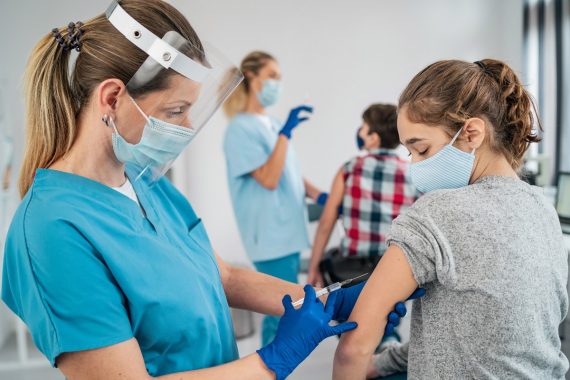UK 16-17-year-olds to become eligible for Covid vaccination

All children aged 16-17 will become eligible for a first dose of Covid vaccine in the UK, following new advice issued by the Joint Committee on Vaccination and Immunisation (JCVI).
This follows last month’s guidance update which expanded eligibility to children aged 12-15 who are deemed at ‘increased risk of serious Covid-19 disease’ or who live with someone who is immunosuppressed.
Vulnerable over-16s should already have been offered vaccination.
Public Health England said the review of guidance was based on ‘more safety data becoming available’ and ‘changes in the way Covid-19 has been spreading in the UK, particularly in younger age groups’.
Currently, the Pfizer vaccine is the only Covid jab authorised by the MHRA for use in teenagers in the UK.
But PHE acknowledged that ‘some serious side effects have been reported in this younger age group’, linked with the vaccine.
US regulators recently issued a warning of rare heart inflammation following Pfizer and Moderna jabs, but it still recommends that children are vaccinated.
The JCVI’s review of the side effects – myocarditis (inflammation of the heart muscle) and pericarditis (inflammation of the membrane around the heart) – found they were ‘extremely rare and usually occur within a few days of the second dose, typically more in young men’.
But it added that because Covid is ‘usually mild in younger people’ it is ‘important to weigh up the benefits of any vaccine against the possible, although extremely rare, side effects’.
Therefore, ‘prioritising the first dose and delaying the recommendation on the second, allows the JCVI to provide the best available advice with the latest available information for the second dose, whilst providing some immediate protection from severe disease’, the announcement said.
As for when 16-17-year-olds will get their second dose of vaccine, it said the ‘the aim’ is for this to be ‘from’, but not necessarily at, 12 weeks following the first dose.
The JCVI also said this delay would ‘extend protection for a longer period’.
JCVI chair Professor Wei Shen Lim said: ‘After carefully considering the latest data, we advise that healthy 16-to17-year-olds are offered a first dose of Pfizer-BioNTech vaccine. Advice on when to offer the second vaccine dose will come later.
‘While Covid-19 is typically mild or asymptomatic in most young people, it can be very unpleasant for some and for this particular age group, we expect one dose of the vaccine to provide good protection against severe illness and hospitalisation.’
Unlike 12-15-year-olds, children aged 16 and older do not require parental consent to be vaccinated.
In a televised technical briefing this afternoon, deputy chief medical officer Professor Jonathan Van-Tam said he expects vaccinations of 16-17-year-olds to start ‘within a very short number of weeks’.
Professor Van-Tam also said the next step would be to review whether the vaccination campaign should be extended to healthy 12-15-year-olds.
Health secretary Sajid Javid said: ‘Today’s advice from the independent Joint Committee on Vaccination and Immunisation (JCVI) means more young people aged 16 and over can benefit from Covid-19 vaccines. I have accepted their expert recommendations and I have asked the NHS to prepare to vaccinate those eligible as soon as possible.
‘The JCVI have not recommended vaccinating under-16s without underlying health conditions but will keep its position under review based on the latest data.’
All children will be vaccinated using the Pfizer vaccine. In May, Moderna also announced that its vaccine is effective in 12-18-year-olds after a study saw no cases of Covid-19 in those who had two doses, but it is yet to receive MHRA approval for this age group.
Meanwhile, a paediatric trial of the Oxford/AstraZeneca vaccine was launched in February but it later ‘postponed’ vaccinations ‘to allow further discussions with the MHRA’ following the reports of rare blood clots.
If younger people experience any of the following symptoms after receiving their vaccination, they should call 111 or see their GP:
- a stabbing pain and/or tightness in the chest which may spread across the body
- pain in the neck that may spread across the shoulders and/or arms
- shortness of breath when lightly exercising or walking
- difficulty breathing when resting or feeling light-headed
- flu-like symptoms such as a high temperature, tiredness and fatigue
- palpitations or an abnormal heart rhythm
- feeling like you need to be sick
Source: JCVI
Pulse October survey
Take our July 2025 survey to potentially win £1.000 worth of tokens

Visit Pulse Reference for details on 140 symptoms, including easily searchable symptoms and categories, offering you a free platform to check symptoms and receive potential diagnoses during consultations.
Related Articles
READERS' COMMENTS [3]
Please note, only GPs are permitted to add comments to articles










Think the excitement is gone. Need to truly talk about something else.
“If younger people experience any of the following symptoms after receiving their vaccination, they should call 111 or see their GP:
a stabbing pain and/or tightness in the chest which may spread across the body
pain in the neck that may spread across the shoulders and/or arms
shortness of breath when lightly exercising or walking
difficulty breathing when resting or feeling light-headed
flu-like symptoms such as a high temperature, tiredness and fatigue
palpitations or an abnormal heart rhythm
feeling like you need to be sick”
This is about possible Pfizer related myocarditis /pericarditis- URGENT medical advice is suggested in our local guidance. This should be directed to A+E not GPs- due to obvious diagnostic constraints and urgency
not needed–risk may outweigh benefit
and informed consent?
potential for claims against gps–leave jabs to nhs?